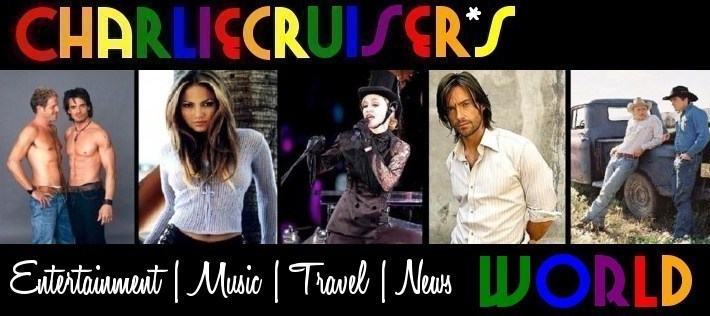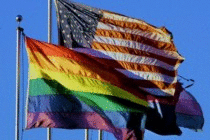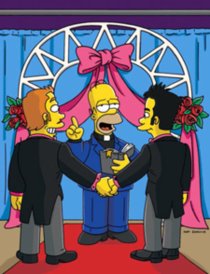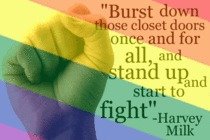 With a plum new role on Glee and a repeat gig on 30 Rock, Cheyenne Jackson puts to rest the old Hollywood axiom that being gay doesn't pay.
With a plum new role on Glee and a repeat gig on 30 Rock, Cheyenne Jackson puts to rest the old Hollywood axiom that being gay doesn't pay.Fast-forward past the small-town childhood, and the stubborn, insistent facts of an austere upbringing -- an outhouse, no running water (“I promised my mom I would quit talking about it.”). Skip the reproving sign atop the TV set -- If Jesus lived here would you be watching this? -- and the ban on unwholesome music. Start, instead, in the Gulf of Mexico with the bang of an epiphany -- every good story needs one, and Cheyenne Jackson’s is a peach.
It is July 1993. Along with his fellow teen missionaries, the young Jackson is handing out New Testaments, bumper stickers, and smiles. The bumper stickers read diga no a la pornografía (say no to pornography), and the trick is to catch drivers as they pause at the stoplight. “It was so bizarre and misguided,” says Jackson. “People were shamed into letting us put them on their car, but then the light would turn green and -- you know, bumper stickers! You have to do it clean and smoothly.” He mimics the act of smoothing out the wrinkles as cars lurch forward, the smiling missionaries staggering in their wake. It’s a funny image; the kind of thing Tina Fey might crib as back story for Kenneth the Page, the doltish office drudge on 30 Rock, in which Jackson has a recurring role. But it’s not a punch line on NBC, and the memory stirs complicated emotions for the teller. Jackson’s instinct is to charm and entertain, but the easy grace he projects is also a smoke screen. There are things still being worked out, processed. “This is gonna get deep,” he warns. “I don’t know if I want to say this.” He swallows, composes himself, and summons the memory.
It is July 12, and the missionaries are at the beach to celebrate Jackson’s 18th birthday. There is a cake, dyed blue. There is Jackson’s girlfriend, Willow (“We always said we were gonna name our kid Shiloh. Like, combine our names.”). The boys and girls are singing Jesus songs, playing guitar, weeping tears of gratitude and joy, but Jackson is not among them. He is out in the ocean, treading water, gazing back on the scene.
“I never felt further away from who I really am,” he says. “I’m ready to go out in the world and be who I’m supposed to be, but I am so conflicted because the church and everything in that world is telling me that who I am is wrong, just wrong. And I know I’m a good person, I know that I treat people with kindness and that I try to make the world a better place. How can who I am be wrong? And in that moment I just know that something has to change. I have to acknowledge it. I’ve never said it out loud, like ‘I’m gay.’ I go pretty far down underwater, not trying to hurt myself, or anything, but it’s the sense that I want to sink. And I look up and I can see the sun above the water, and it’s almost as if I feel something reach in and pull me up. And when I surface I am totally different. I’ve made a decision. And I look at the kids, and for once I don’t feel disdain or wish I could feel what they are feeling. I don’t wish that I could have real tears when I close my eyes to pray. I feel like this is the first day.”
Jackson turned 35 this summer, celebrating with a small birthday party at Paris Commune, a restaurant in New York City’s West Village. It was a typically low-key affair. The actor Alan Cumming came by with his partner. Ricki Lake stopped in for a quick toast. Jackson ordered the halibut and a gin and tonic. It was a busy time for the actor. He’d just filmed an episode for the eighth season of Curb Your Enthusiasm and was due to start filming a movie, The Green, starring opposite Julia Ormond, in which Jackson plays the partner of a drama teacher (Jason Butler Harner) caught up in a sexual harassment case. Although a project with HBO had recently fallen through, the actor had just been told that Ryan Murphy had written him into the third season of Glee, as the new coach of Vocal Adrenaline, and his mood was buoyant. In the eight years since he moved to New York City, he’s built an enviable résumé of successful Broadway roles, including Chad in All Shook Up and Sonny in the Tony-nominated pop opera Xanadu, as well as his role in 30 Rock, but he wears his fame lightly, never playing the diva or taking his success for granted. It’s a quality that sets him apart from many of his peers. “He’s just so low-key and undemanding and unpretentious with his approach and his delivery -- there are no boundaries, no rules, which is unique in that business,” says the designer Kenneth Cole who knows Jackson through his work for amfAR, the AIDS research foundation of which Cole is chairman. For David Mixner, a long time gay activist and fundraiser, Jackson is “a man who not only has heart but gives it to this community unconditionally.”
A few months after that birthday dinner, Jackson and his partner of more than 10 years, Monte Lapka, walked into New York’s City Hall and registered as domestic partners. “We wanted to get as married as we could,” says Jackson. “I think we were filling in some forms for wills or insurance, and I just thought, Let’s just make this as legal as we can. It was with a bunch of Russian mail order brides, literally. And it was hilarious and it was romantic, just he and me, our little secret.” Although Lapka, a trained physicist, is apparently ambivalent about marriage proper, his status on Jackson’s Wikipedia page is already listed as “spouse.” The boy of 18 who had never said “I’m gay” has come a long way.
Truth to tell, Jackson’s journey has its roots a decade before his dunk in the ocean, in the showers of a local health club in Newport, Washington (population 1,921), where a young Cheyenne found himself staring a little too intensely at his Christian scout leader. He was 7 or 8 at the time. “I remember seeing him and feeling just different -- my stomach was tingly, and I felt weird, and I liked it,” he remembers. As casually as possible, Jackson asked the scout leader if he knew where he might find his father, though the question was superfluous. “He was like, ‘No, Cheyenne, I haven’t seen him.’ And I ran back upstairs and pretended that I was still looking for my dad and ran down again so I could get another peek. I was like, ‘I can’t find him anywhere, know where he is?’ ‘No, I still don’t know.’"
 Jackson’s performance in the showers that day was the first inkling of what was to come, a harbinger of years of nimble dissembling and self-denial. What was, perhaps, less predictable was that the church should be the beneficiary of all those pent-up emotions and repressed energies. But for the 8-year-old Jackson, the church represented music, singing, escape. “Singing was everything to me,” he says. “It gave me hope.” It also gave him an audience. As worship leader at the age of 14, he got to lead the congregation in a handful of songs preceding the sermon, an early platform for his musical gifts and a galvanizing insight into the power of song to connect and inspire. (At a September fundraiser for Fight Back New York, a pressure group aimed at removing anti-equality state senators from office, you could detect this influence in the quiet fervor with which he sang Sam Cooke’s “A Change Is Gonna Come”).
Jackson’s performance in the showers that day was the first inkling of what was to come, a harbinger of years of nimble dissembling and self-denial. What was, perhaps, less predictable was that the church should be the beneficiary of all those pent-up emotions and repressed energies. But for the 8-year-old Jackson, the church represented music, singing, escape. “Singing was everything to me,” he says. “It gave me hope.” It also gave him an audience. As worship leader at the age of 14, he got to lead the congregation in a handful of songs preceding the sermon, an early platform for his musical gifts and a galvanizing insight into the power of song to connect and inspire. (At a September fundraiser for Fight Back New York, a pressure group aimed at removing anti-equality state senators from office, you could detect this influence in the quiet fervor with which he sang Sam Cooke’s “A Change Is Gonna Come”).Jackson readily admits that the church planted the seeds of service that now finds expression in his work for amfAR and the Point Foundation. Digging ditches in Mexico and working in orphanages made him feel less powerless, less self-absorbed. It’s not a stretch to say that the church prepared him to be the advocate he’s become, one of the few entertainers unafraid to be out and outspoken. That’s a rare combination in a culture where knee-jerk homophobia keeps most actors in the closet until they’re shamed or driven out of it. Entertaining and activism don’t always go hand-in-hand, but Jackson is helped by his old-school charm. He has a quick, broad smile and a gentle wit that would have made him an excellent leading man in the screwball comedies that Hollywood turned out in the 1930s and ’40s, movies like Bringing Up Baby and His Girl Friday. It’s the kind of quality that makes people take out their checkbooks at the end of a long fundraising dinner.
“He has such a big and tender heart,” says Sherri Jackson on the telephone from Newport. She has been counting off all of the shows in which she’s seen her son perform, starting with Bye Bye Birdie and Li’l Abner in high school -- “he was in a show choir, which was a lot like Glee” -- through his early career in Seattle and his headline-grabbing roles on Broadway. When United 93, in which Jackson played gay hero Mark Bingham, came to the local Roxy in 2006 -- “the town was so supportive, the editor of the newspaper even wrote an editorial about it” -- she circled around every night just to count how many people were there. “I haven’t missed a thing he’s done,” she says, before pausing to correct this sweeping statement. “Actually, the only one I’ve missed,” -- she lets out a long, ironic laugh -- “is The Best Little Whorehouse in Texas. That was a little raw. And I think I missed Rocky, as well, in Seattle.”
The omissions are telling. Prominent members of their church and local community, the Jacksons were born-again Christians with a devout belief in the teachings of the Bible. Jackson’s father was a police officer and undersheriff with a love of Westerns (Cheyenne was named after the long-running TV show starring Clint Walker as the eponymous gun-slinging hero, and not the Native American tribe from which he is partly descended). His mother was a police dispatcher. Church was compulsory, twice a week for three-and-a-half hours at a time, plus Sunday School. At home, they played Christian music -- Amy Grant, Michael W. Smith, Sandi Patty, and DeGarmo & Key. Jackson, who still remembers the Spokane Christian bookstore pulling Amy Grant’s CDs in retaliation for her “secular” duet with Peter Cetera, says he’s had to play catch-up on a lot of pop culture from his childhood. (Maybe a little too much; Lapka complains that Jackson is addicted to “what I call train-wreck TV, and I hate all of those reality shows.”)
Although Sherri Jackson does not dwell on the complicated reconciliation that followed her son’s coming out -- he called a meeting to address his parents and three siblings when he was 19 -- it’s clear that it was a long, painful process. “It was a difficult time,” she concedes. “It can be real divisive, but I feel we weathered it very well. I feel it opens your heart. I feel I’ve become more openhearted, because otherwise the world can be black and white, and it isn’t. It’s good to grow.”
Perversely, given the religious tenor of his upbringing, to say nothing of that stern warning on the TV set, no effort was made to deter young Cheyenne from worshiping another major deity: Wonder Woman. Even from a distance of 25 years, the memory of his weekly Lynda Carter fix gives Jackson goosebumps. A few years ago, his father found an old woodburning art kit of the kind once popular among boy scouts. The idea was to use a woodburning pen to etch around a suitably masculine image on a piece of wood, in this case a muscle car. Jackson, however, must have lost interest part way through. “It was as if I started it and was, like, ‘Eh, I don’t want to do that.’ And then I turn it over, and on the other side, I’d freehanded a portrait of Wonder Woman. Not only that, I’d added watercolors. I had her blue undies and her red thing. I just thought that was a perfect encapsulation of me as a child.”
The etching is now up on his fridge in the Manhattan apartment he shares with Lapka. “It’s one of my favorite things just because what it represents is so personal,” he says. “I know exactly what I felt like being that 8-year-old boy in Idaho where there are no gay people -- well, there are two gay people, they’re called the dump dykes, and they run the dump -- and no black people. It’s 40 miles from the Aryan Nation’s compound. So to be different and to know that you’re just from another planet…” He trails off, before resuming with an anecdote about meeting Carter some years ago at Feinstein’s in New York. She was singing Rita Hayworth numbers such as “Put the Blame on Mame,” and Jackson, who has several of her albums as well as one of the few VHS copies of her movie, Bobbie Jo and the Outlaw, was finally able to tell her how much she meant to him. “I told her everything and she was so lovely. And it’s so strange -- so not strange -- but so many people feel the exact same way.”
For Lapka, Jackson’s guileless quality and big-hearted enthusiasm is both an asset and a liability. “He goes into every situation believing in everyone,” he says. “That’s a wonderful quality, but it also leaves him exposed. If I could change anything about that I’d want him to self-protect more, but I don’t think he’d be the same person if he did.” Tall and muscular, with a keen, dry wit, Lapka loves to quote from books and TV shows (he describes his relationship to Jackson by paraphrasing a line from The Simpsons, in which Homer tells Marge, “Our differences are on the surface, but our sames go all the way down.”) and tends to stay in the background, volleying quips whenever they encounter annoying celebrity behavior.
For his part, Jackson looks to Lapka, who he met in Seattle -- “he was working at corporate Starbucks doing his science-nerd algorithm physics stuff” -- as an example of how to be in his own life -- resolute, confident, fearless. He tells a revealing anecdote about rehearsing for All Shook Up, his first major Broadway role. Harvey Weinstein was one of the producers, and on Jackson’s request recommended an acting coach to help him develop the character. “He immediately just broke down my façade -- all my bullshit -- and challenged me to own my own space,” recalls Jackson. The coach took him to Ninth Avenue in Manhattan, pointed down the busy sidewalk, and commanded him to walk right down the center, not bobbing or weaving as Jackson would ordinarily do. “They’ll move for you,” he told the hesitant actor. “It was very hard,” recalls Jackson. “People were like, ‘Asshole, I’m holding groceries here, what the fuck,’ but I did it. I learned to hold my own space.” He smiles. “That’s when things really started happening.”
To see a slide show of images featuring Cheyenne Jackson in OUT magazine, click here.












No comments:
Post a Comment